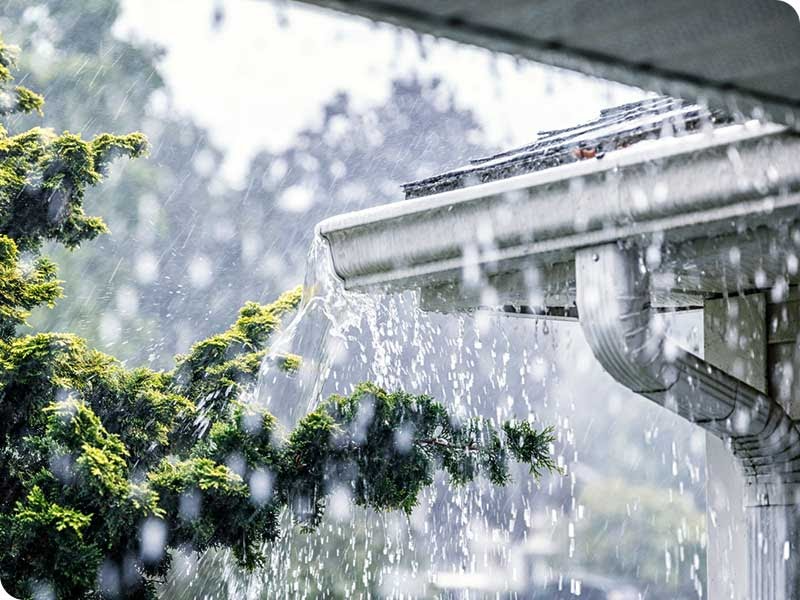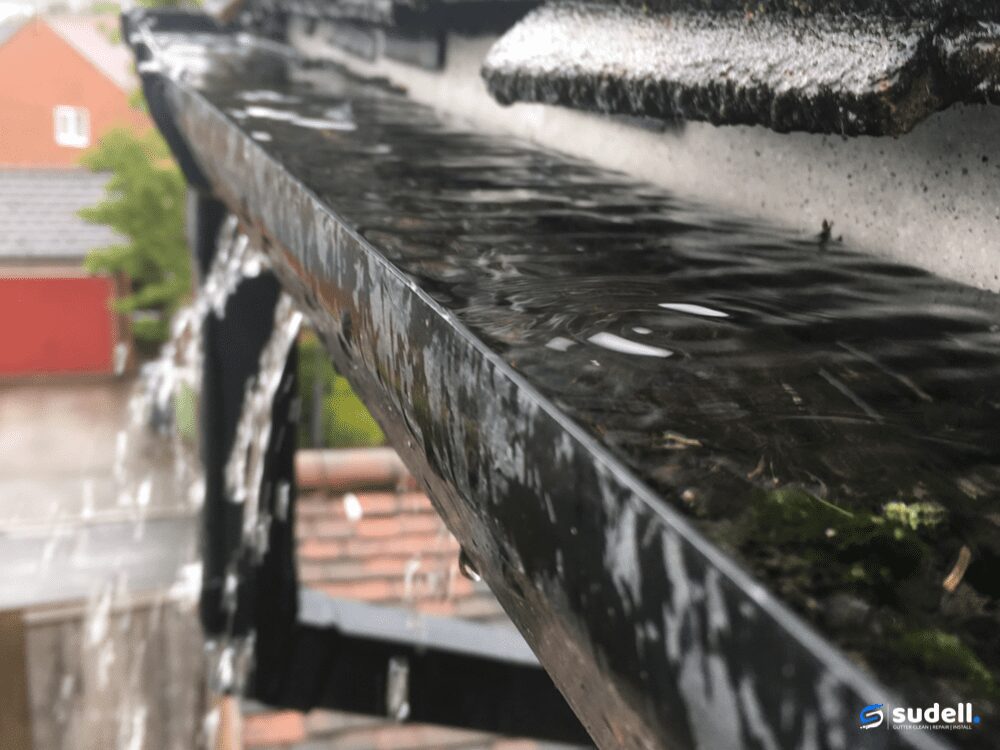You glance out your window and notice a waterfall cascading from your gutters. It’s a scene that’s all too familiar during rainy days, but have you ever stopped to wonder why your gutters are overflowing?
This isn’t just a minor inconvenience; it could be a sign of underlying issues that might cost you more than you think. Imagine the peace of mind knowing your home is protected from water damage. Understanding the reasons behind your overflowing gutters is the first step toward safeguarding your home and your wallet.
So, why are your gutters misbehaving, and what can you do about it? Stick with us as we dive into the common culprits and solutions that will keep your gutters flowing smoothly.

Credit: www.barrybest.com
Common Causes Of Gutter Overflow
Gutter overflow is a common issue that many homeowners face. Understanding the causes can help prevent damage to your home. There are several reasons why gutters might overflow. Let’s explore these common causes and find solutions to keep your gutters in top shape.
Clogged Gutters
Leaves and twigs often block water flow in gutters. This blockage causes water to spill over the sides. Regular cleaning helps remove debris and prevents overflow. Check your gutters often, especially after storms.
Improper Gutter Installation
Incorrect installation can lead to poor water drainage. Gutters must be properly angled for water flow. If not, water collects and spills over. Professional installation ensures correct positioning and function.
Insufficient Gutter Capacity
Small gutters cannot handle heavy rain. Large roofs need larger gutters to manage water flow. Consider upgrading to bigger gutters if you experience frequent overflow during storms.
Debris Accumulation
Debris like dirt and small branches gather in gutters. This buildup restricts water movement. Regular inspections help identify and clear debris. Cleaning gutters twice a year is recommended for optimal performance.
Impact Of Weather Conditions
Weather conditions play a significant role in gutter overflow issues. They can lead to blockages, leaks, and other problems. Understanding these impacts is crucial for maintaining effective drainage. Let’s explore how different weather phenomena affect your gutters.
Heavy Rainfall
Heavy rainfall can overwhelm gutter systems. When rain is intense, water flows rapidly into the gutters. This can exceed their capacity, causing overflow. Overflowing gutters may damage your home’s foundation. Regular cleaning helps manage this risk.
Snow And Ice Build-up
Snow and ice can accumulate in gutters during winter months. This build-up blocks proper drainage. As temperatures rise, melting snow adds weight. Excess weight can cause gutters to sag or detach. Preventive measures like gutter guards can be beneficial.
Wind-driven Debris
Strong winds carry leaves, twigs, and other debris. These elements land in gutters, leading to clogs. Clogged gutters restrict water flow. Regular inspections help identify debris build-up. Cleaning gutters periodically reduces overflow risks.
Signs Of Gutter Problems
Overflowing gutters often indicate blockages from leaves or debris. Water spilling over the sides can damage your home’s foundation. Persistent overflow may also suggest improper gutter slope or size.
Keeping your gutters in top shape is crucial for maintaining the health of your home. But how do you know when they’re starting to fail? Recognizing the signs of gutter problems early can save you from costly repairs down the line. Let’s explore some key indicators that your gutters may need attention.Water Stains On Walls
Have you noticed unsightly water stains appearing on your walls? This could be a sign that your gutters are not functioning as they should. When gutters overflow, water can spill onto your walls, leaving behind telltale marks. These stains not only ruin the aesthetic of your home but can also lead to mold and mildew, posing health risks. Regularly inspect your walls for any new water stains and address them promptly.Sagging Gutters
Sagging gutters are more than just an eyesore. They indicate that your gutters are struggling to handle the volume of water they should be managing. This could be due to clogs, improper installation, or simple wear and tear. If your gutters are sagging, they might soon break away from your home, causing further damage. Keep an eye out for this issue, and consider reinforcing or replacing your gutters if needed.Basement Flooding
Has your basement unexpectedly turned into a mini swimming pool? Overflowing gutters can redirect water toward your home’s foundation, leading to basement flooding. This is not only inconvenient but can also damage your foundation and create a breeding ground for mold. Regularly check your basement for any signs of moisture or flooding, especially after heavy rain. If flooding occurs, it might be time to reassess your gutter system. Ignoring these warning signs can lead to expensive repairs and potential health hazards. Have you spotted any of these signs around your home? It might be time for a gutter check-up. Keeping your gutters in good condition will ensure they effectively protect your home, saving you stress and money in the long run.
Credit: sudell.co.uk
Preventive Measures
Gutters overflow due to debris buildup, causing blockages and water damage. Regular cleaning prevents clogs and ensures smooth water flow. Installing gutter guards can further protect against leaves and twigs.
Overflowing gutters are more than just a nuisance; they’re a potential hazard to your home. If you’ve ever watched rainwater cascade over the sides of your gutters, you know it’s a sign that something’s not right. Tackling this issue before it becomes a costly problem is crucial. Let’s dive into some actionable preventive measures you can take to keep your gutters working efficiently.Regular Cleaning Schedule
Keeping your gutters clean is the simplest way to prevent overflow. Set a routine to clean your gutters at least twice a year, especially during the fall when leaves are abundant. You might be surprised how a regular cleaning schedule can save you from expensive repairs. Clogged gutters can lead to water damage in your home’s foundation. During one cleaning session, I found a bird’s nest nestled among the leaves. Imagine the water blockage it caused! Regular checks can help you avoid similar surprises.Gutter Guards And Screens
Consider installing gutter guards or screens to reduce the frequency of cleaning. These handy tools prevent debris from accumulating while allowing water to flow freely. They’re a worthy investment if you want to minimize maintenance time. However, don’t assume they make your gutters maintenance-free. Even with guards, small debris can accumulate over time. Check them periodically to ensure they’re functioning properly.Proper Downspout Alignment
Ensure your downspouts are correctly aligned and free of blockages. Misaligned downspouts can cause water to back up and overflow from the gutters. Make sure they direct water away from your home’s foundation. A friend once told me about a downspout that was inadvertently pushed out of place by a wayward soccer ball. It caused water to flow directly into the basement window well during a storm. A quick check can prevent such an incident. Are your gutters ready for the next rain? By implementing these preventive measures, you can keep them in top shape. Your home will thank you for it.Professional Inspection And Maintenance
Overflowing gutters can lead to serious home damage. Regular inspection and maintenance help prevent these issues. Professionals ensure your gutters function efficiently. They spot problems early, saving you money and stress.
Hiring A Gutter Specialist
Engage a gutter specialist for thorough checks. They have the right tools and expertise. Specialists can identify blockages and structural issues. Their trained eyes catch what you might miss. This reduces risks of water damage.
Routine System Check-ups
Regular check-ups maintain gutter efficiency. Schedule inspections twice a year. This prevents debris buildup and ensures proper water flow. Routine checks also extend the life of your gutters. Consistent maintenance keeps your home safe.
Cost-benefit Analysis
Professional services might seem costly. Consider the long-term benefits. Timely maintenance saves on potential repair costs. Avoiding water damage can protect your home’s value. Investing in upkeep proves more economical over time.

Credit: gutter-guys.co.uk
Diy Solutions For Homeowners
Overflowing gutters can cause damage to your home. Many homeowners prefer DIY solutions. These can save time and money. With a few tools and some effort, you can fix most gutter issues. Let’s explore safe and effective methods to keep your gutters flowing.
Safe Ladder Use
Safety is vital when using a ladder. Choose a sturdy ladder that reaches your roof. Place it on level ground to prevent tipping. Keep three points of contact at all times. This means two hands and one foot, or two feet and one hand. Avoid leaning too far to one side. Move the ladder instead. Wear sturdy shoes for better grip.
Effective Cleaning Tools
Cleaning gutters requires the right tools. A small plastic scoop works well. It helps remove leaves and debris. A garden hose can flush out remaining dirt. Attach a spray nozzle for better pressure. A bucket or tarp collects debris safely. This keeps your yard clean. Wear gloves to protect your hands.
Simple Repairs
Inspect your gutters for leaks and damage. Small holes can be fixed with gutter sealant. Apply it inside the gutter. Let it dry completely. Loose sections need support. Use gutter hangers to secure them. These are easy to install. Check downspouts for clogs. A plumber’s snake can help clear them. Regular maintenance prevents bigger problems.
Frequently Asked Questions
What Causes Gutters To Overflow During Rain?
Clogged debris. Leaves, twigs, and dirt block water flow. Regular cleaning helps.
How Often Should Gutters Be Cleaned?
Twice a year. Spring and fall are ideal. More if trees are nearby.
Can Gutter Guards Prevent Overflow?
Yes. They keep debris out. But, still need occasional cleaning.
Do Overflowing Gutters Damage My Home?
Yes. Water can damage foundations, walls, and roofs. Prevent with maintenance.
Why Do Gutters Overflow Even When Clean?
Improper installation. Wrong slope or size. Check and fix alignment or size.
Conclusion
Gutters need care to avoid overflow problems. Simple maintenance tasks make a big difference. Regular cleaning helps keep water flowing smoothly. Check for clogs often. Remove leaves and debris. Inspect for damage to prevent leaks. Consider gutter guards for extra protection.
A little effort keeps your home safe. Overflowing gutters can lead to costly repairs. Protect your foundation and roof. Take action today. Keep gutters clear and functioning well. Save time and money in the long run. Enjoy peace of mind with well-maintained gutters.





